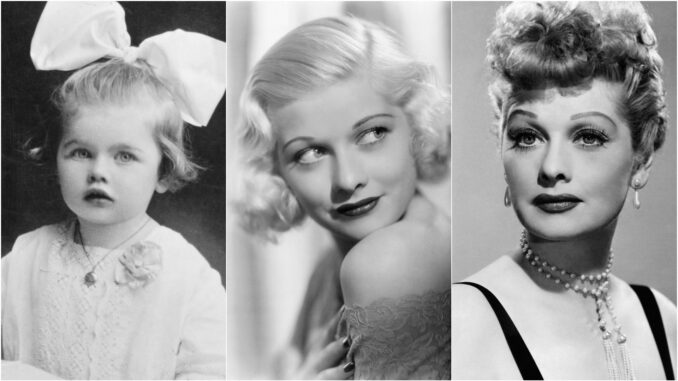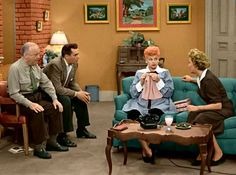
Introduction: The Birth of a TV Legend
When “I Love Lucy” hit the airwaves in 1951, no one could have predicted the seismic shift it would cause in television history. Lucille Ball wasn’t just a comedian; she was a revolutionary force who reshaped the landscape of TV forever. But how exactly did she do it? Let’s dive into the incredible impact of “I Love Lucy” and how it became the blueprint for modern sitcoms.
The Genius Behind “I Love Lucy”
Lucille Ball: More Than Just a Comedian
Lucille Ball’s impeccable timing and physical comedy skills weren’t just talents—they were game-changers. Her ability to make audiences laugh with her exaggerated facial expressions and slapstick humor set her apart from other actresses of her time.
Desi Arnaz: The Unsung Visionary
While Ball was the face of the show, Desi Arnaz, her husband, was its backbone. Arnaz brought innovative production techniques that transformed the way television was made. Together, they created magic on-screen and behind the scenes.

How “I Love Lucy” Redefined Sitcoms
The First to Use a Multi-Camera Setup
Before “I Love Lucy,” TV shows were often filmed live or with a single camera. Desi Arnaz introduced the multi-camera setup, allowing for dynamic angles while maintaining a live audience’s laughter. This technique is now a sitcom standard.
The Birth of the Live Studio Audience
Hearing genuine laughter adds an irreplaceable energy to sitcoms. “I Love Lucy” was among the first to incorporate a live studio audience, creating a more interactive and engaging viewing experience.
Syndication: Making Reruns a Thing
Ever binge-watched a show? You can thank “I Love Lucy” for that. It was one of the first series to be syndicated, proving that reruns could be both profitable and popular.
Breaking Cultural Barriers
A Real-Life Interracial Couple on Screen
In the 1950s, seeing Lucille Ball and Desi Arnaz, a real-life interracial couple, on television was groundbreaking. Despite initial pushback from networks, their chemistry and love story resonated with audiences, paving the way for greater representation in media.
Showcasing Strong Female Leads
Lucille Ball’s portrayal of Lucy Ricardo wasn’t just comedic; it was empowering. She showed that women could be funny, ambitious, and complex, breaking stereotypes of the “perfect housewife” that dominated the era.
Iconic Episodes That Shaped TV
“Lucy Does a Commercial”
Who can forget Lucy’s hilarious attempt to sell Vitameatavegamin? This episode became one of the most memorable in TV history, showcasing Ball’s mastery of physical comedy.
“Job Switching”
Lucy and Ethel working at a candy factory, struggling to keep up with a speeding conveyor belt, remains an iconic scene. It’s a testament to how “I Love Lucy” blended humor with relatable, everyday challenges.
“Lucy Goes to the Hospital”
When Lucy Ricardo gave birth on-screen, it was a monumental moment. The episode drew over 44 million viewers, surpassing even President Eisenhower’s inauguration. It highlighted the show’s cultural significance and widespread appeal.

Setting the Stage for Future Female Comedians
Trailblazing for Women in Comedy
Without Lucille Ball, there might not be a Carol Burnett, Tina Fey, or Amy Poehler. Ball’s success showed networks that women could lead top-rated shows, paving the way for future generations.
Behind the Scenes Power
Lucille Ball didn’t just act; she was a producer. As one of the first women to own her own production company, Desilu Productions, Ball proved that women could dominate both in front of and behind the camera.
The Legacy of “I Love Lucy”
Influence on Modern Sitcoms
Shows like “Friends,” “The Big Bang Theory,” and “Modern Family” owe a debt to “I Love Lucy.” The multi-camera format, live audience laughter, and serialized storytelling all trace back to Ball and Arnaz’s innovations.
Eternal Popularity
Even decades later, “I Love Lucy” remains a cultural touchstone. It’s a staple on streaming platforms and continues to draw new fans, proving its timeless appeal.
Award-Winning Brilliance
The show wasn’t just a fan favorite; it was critically acclaimed. “I Love Lucy” won numerous Emmy Awards and has been consistently ranked among the greatest TV shows of all time.
Conclusion: A Legacy That Lives On
Lucille Ball didn’t just change television; she transformed it. Through “I Love Lucy,” she set the standard for comedy, representation, and innovation. Her influence is felt in every sitcom that graces our screens today. From her iconic antics to her groundbreaking production methods, Ball’s legacy proves that laughter truly is timeless.
FAQs
1. Why was “I Love Lucy” so groundbreaking?
“I Love Lucy” revolutionized television with its multi-camera setup, live studio audience, and groundbreaking themes, such as showcasing an interracial couple and a strong female lead.
2. How did Lucille Ball impact female representation in TV?
Ball’s portrayal of Lucy Ricardo showed that women could be comedic leads, while her role as a producer paved the way for women to take on powerful roles behind the scenes.
3. What made “I Love Lucy” so popular?
Its relatable humor, innovative production techniques, and charismatic performances made it a hit with audiences across the globe.
4. Is “I Love Lucy” still relevant today?
Absolutely! The show’s humor, themes, and production style continue to influence modern sitcoms, proving its enduring legacy.
5. What other shows did Lucille Ball produce?
Through Desilu Productions, Ball produced several iconic shows, including “Star Trek” and “The Andy Griffith Show.”